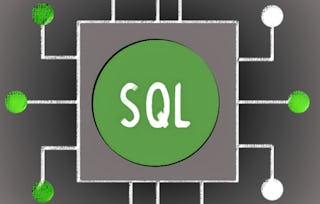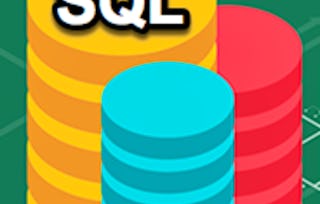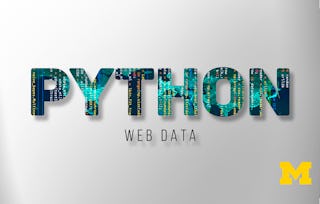Ce cours présente aux étudiants les bases du langage de requête structuré (SQL) ainsi que la conception d'une base de données de base pour le stockage des données dans le cadre d'un effort de collecte, d'analyse et de traitement des données en plusieurs étapes. Le cours utilisera SQLite3 comme base de données. Nous construirons également des robots d'indexation et des processus de collecte et de visualisation de données en plusieurs étapes. Nous utiliserons la bibliothèque D3.js pour faire de la visualisation de données de base. Ce cours couvrira les chapitres 14-15 du livre "Python for Everybody". Pour réussir ce cours, vous devez être familier avec le matériel couvert dans les chapitres 1-13 du manuel et les trois premiers cours de cette spécialisation. Ce cours couvre Python 3.

Utiliser les bases de données avec Python

Utiliser les bases de données avec Python
Ce cours fait partie de Spécialisation Python pour tous
Enseigné en Français (doublage IA)

Instructeur : Charles Russell Severance
539 171 déjà inscrits
Inclus avec
21,558 reviews
Ce que vous apprendrez
Utilisez les opérations de création, de lecture, de mise à jour et de suppression pour gérer les bases de données
Expliquer les bases de Python orienté objet
Comprendre comment les données sont stockées dans plusieurs tables d'une base de données
Utiliser l'API Google Maps pour visualiser les données
Compétences que vous acquerrez
- Catégorie : Programmation en Python
- Catégorie : Web scraping
- Catégorie : Traitement des données
- Catégorie : Bases de données
- Catégorie : Conception de la base de données
- Catégorie : Logiciel de Visualisation de Données
- Catégorie : Programmation orientée objet (POO)
- Catégorie : Systèmes d'information géographique
- Catégorie : Modélisation des données
- Catégorie : Bases de données relationnelles
- Catégorie : SQL
- Catégorie : Interface de programmation d'application (API)
Détails à connaître

Ajouter à votre profil LinkedIn
5 devoirs
Découvrez comment les employés des entreprises prestigieuses maîtrisent des compétences recherchées

Élaborez votre expertise du sujet
- Apprenez de nouveaux concepts auprès d'experts du secteur
- Acquérez une compréhension de base d'un sujet ou d'un outil
- Développez des compétences professionnelles avec des projets pratiques
- Obtenez un certificat professionnel partageable

Il y a 5 modules dans ce cours
Pour commencer ce cours, nous couvrons les bases de Python orienté objet. Nous n'écrirons pas nos propres objets, mais comme beaucoup de choses que nous utilisons comme BeautifulSoup, les chaînes de caractères, les dictionnaires, les connexions aux bases de données utilisent toutes des modèles orientés objet (OO), nous devrions au moins comprendre certains de ses modèles et de sa terminologie.
Inclus
12 vidéos4 lectures2 devoirs
Nous apprenons les quatre principales opérations CRUD (Créer, Lire, Mettre à jour et Supprimer) pour gérer les données stockées dans une base de données.
Inclus
6 vidéos1 devoir2 éléments d'application
Dans cette section, nous verrons comment les données sont stockées dans plusieurs tables d'une base de données et comment les lignes sont liées (c'est-à-dire que nous établissons des relations) dans la base de données.
Inclus
8 vidéos1 devoir1 élément d'application
Dans cette section, nous étudions comment modéliser des situations telles que des étudiants s'inscrivant à des cours où chaque cours compte de nombreux étudiants et où chaque étudiant est inscrit à de nombreux cours.
Inclus
4 vidéos1 devoir1 élément d'application
Dans cette section, nous mettons tout cela ensemble, nous récupérons et traitons certaines données, puis nous utilisons l'API OpenStreetMaps pour visualiser nos données.
Inclus
5 vidéos3 lectures1 élément d'application
Obtenez un certificat professionnel
Ajoutez ce titre à votre profil LinkedIn, à votre curriculum vitae ou à votre CV. Partagez-le sur les médias sociaux et dans votre évaluation des performances.
Instructeur

Offert par
En savoir plus sur Développement de logiciels
 Statut : Essai gratuit
Statut : Essai gratuitDuke University
 Statut : Essai gratuit
Statut : Essai gratuit Statut : Essai gratuit
Statut : Essai gratuitMeta
 Statut : Essai gratuit
Statut : Essai gratuitUniversity of Michigan
Pour quelles raisons les étudiants sur Coursera nous choisissent-ils pour leur carrière ?

Felipe M.

Jennifer J.

Larry W.

Chaitanya A.
Avis des étudiants
- 5 stars
82,13 %
- 4 stars
14,17 %
- 3 stars
2,26 %
- 2 stars
0,47 %
- 1 star
0,94 %
Affichage de 3 sur 21558
Révisé le 5 juil. 2018
Well taught course, with material made easy to understand and discussed in an engaging way. The assignments really help to solidify your understanding and are like puzzles that I enjoy working at.
Révisé le 21 nov. 2017
the way this course is design is absolutely amiziong. just good amount of most important information is provided. task are not too complecated to finish (maybe coudl be little more dificult:) love it!
Révisé le 16 janv. 2016
Excellent refresher for me; and a good basic level course for those new to programming and want to understand the basic concepts of writing code, connecting and parsing data in a much easier way.

Ouvrez de nouvelles portes avec Coursera Plus
Accès illimité à 10,000+ cours de niveau international, projets pratiques et programmes de certification prêts à l'emploi - tous inclus dans votre abonnement.
Faites progresser votre carrière avec un diplôme en ligne
Obtenez un diplôme auprès d’universités de renommée mondiale - 100 % en ligne
Rejoignez plus de 3 400 entreprises mondiales qui ont choisi Coursera pour les affaires
Améliorez les compétences de vos employés pour exceller dans l’économie numérique
Foire Aux Questions
Pour accéder aux supports de cours, aux devoirs et pour obtenir un certificat, vous devez acheter l'expérience de certificat lorsque vous vous inscrivez à un cours. Vous pouvez essayer un essai gratuit ou demander une aide financière. Le cours peut proposer l'option "Cours complet, pas de certificat". Cette option vous permet de consulter tous les supports de cours, de soumettre les évaluations requises et d'obtenir une note finale. Cela signifie également que vous ne pourrez pas acheter un certificat d'expérience.
Lorsque vous vous inscrivez au cours, vous avez accès à tous les cours de la spécialisation et vous obtenez un certificat lorsque vous terminez le travail. Votre certificat électronique sera ajouté à votre page Réalisations - de là, vous pouvez imprimer votre certificat ou l'ajouter à votre profil LinkedIn.
Oui, pour certains programmes de formation, vous pouvez demander une aide financière ou une bourse si vous n'avez pas les moyens de payer les frais d'inscription. Si une aide financière ou une bourse est disponible pour votre programme de formation, vous trouverez un lien de demande sur la page de description.
Plus de questions
Aide financière disponible,

